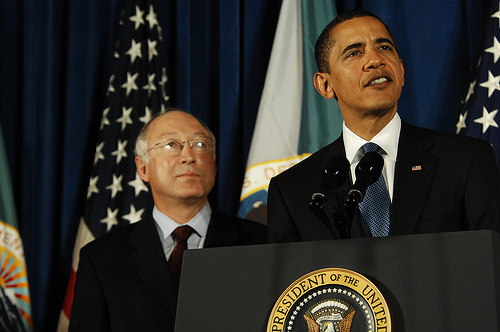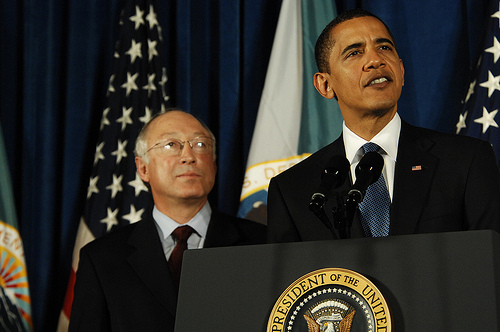 The future’s looking sooty.Photo: Tami Heilemann, DOIInterior Secretary Ken Salazar announced yesterday an enormous expansion in coal mining that threatens to increase U.S. climate pollution by an amount equivalent to more than half of what the United States currently emits in a year. A statement from Wild Earth Guardians, Sierra Club, and Defenders of Wildlife put the announcement in perspective:
The future’s looking sooty.Photo: Tami Heilemann, DOIInterior Secretary Ken Salazar announced yesterday an enormous expansion in coal mining that threatens to increase U.S. climate pollution by an amount equivalent to more than half of what the United States currently emits in a year. A statement from Wild Earth Guardians, Sierra Club, and Defenders of Wildlife put the announcement in perspective:
When burned, the coal threatens to release more than 3.9 billion tons of heat-trapping carbon dioxide, equal to the annual emissions from 300 coal-fired power plants, further cementing the United States as a leading contributor to climate disruption … Salazar’s announcement is a stark contrast to his call for clean energy. Interior, for example, touted that in 2010, 4,000 megawatts of renewable energy development were authorized. And in today’s press conference, Secretary Salazar announced Interior’s intent to authorize more than 12,000 megawatts of renewable energy by the end of next year … Yet in opening the door for 2.35 billion tons of coal mining, Salazar’s announcement effectively enables more than 300,000 megawatts of coal-fired energy — 30 times more dirty energy development than renewable energy.
In other words, despite his administration’s rhetorical embrace of clean energy, Obama is effectively using modest wind and solar investments as cover for a broader embrace of dirty fuels. It’s the same strategy BP, Chevron, and other major polluters use: tout modest environmental investments in multi-million dollar PR campaigns, while putting the real money into fossil fuel development.
President Obama seems to be rushing to make this embrace even tighter: in the last week, the administration announced four new permits for deepwater offshore oil drilling in the Gulf of Mexico — the same type of exploration that led to the BP oil spill disaster. Like most of his giveaways to polluters, however, this one failed equally to generate much praise from major polluting industries:
“We look forward to the day when a single permit on plan doesn’t merit a press conference by the Secretary of the Interior,” said the American Petroleum Institute’s Erik Milito in response.
Even during his trip to Brazil, Obama paid lip service to “green energy,” but then gushed over Brazil’s recent offshore oil discovery and added, “When you’re ready to start selling, we want to be one of your best customers … the United States could not be happier with the potential for a new, stable source of energy.”
Of course, in a repeat of the pattern that has bedeviled all his previous enthusiastic embraces of dirty energy, within 48 hours of his speech, a freighter from Rio de Jainero ran aground on the Tristan da Cunha islands in the South Atlantic, spilling tons of heavy crude onto the islands — and sending pictures of more than 20,000 oil-coated endangered rockhopper penguins beaming around the globe.
Even when Obama talks about “green” energy now, it’s typically the environmentally destructive type. In Brazil, he touted the country’s reliance on biofuels and hydropower, both of which are blamed for Brazil’s massive deforestation. Sugarcane development for biofuel has eaten up more than half the country’s Cerrado, “a vast plateau where temperatures range from freezing to steaming hot and bushes and grasslands alternate with forests and the richest variety of flora of all the world’s savannas,” such as jaguars, blue macaws, and giant armadillos, as the Washington Post’s Sabrina Valle reported. And hydropower projects like the proposed Belo Monte dam threaten to inundate vast areas of forest — a whopping 150 square miles in the case of the Belo Monte — while displacing thousands of indigenous Kayapo people.
Taken together, Obama’s deepening (and generally unrequited) love for big polluters represents a real challenge for the environmental movement, which has always allowed its hopes — and its fear of the far right — to obscure the dirty realities of Obama’s actions. But we’re now confronted with the prospect that Obama’s pro-fossil fuel policies threaten to dwarf positive steps such as increasing fuel efficiency standards for cars and trucks — and his EPA’s (court-mandated) “modest” regulation of greenhouse gases.
I hope this is a moment of opportunity for the environmental movement, and a broader progressive movement that has been increasingly spurned by a president moving ever rightward. Freeing ourselves from our own unrequited love affair with Obama can liberate us to adopt a strategy that might actually protect the environment and turn Obama’s shift around: at a minimum, we need to join Sen. Bernie Sanders’ (D-Vt.) search for a progressive pro-environment primary challenger to Obama. The real prospect of such a challenger is the one thing that could alter Obama’s triangulating political calculus.
But we also need to consider our broader approach to accountability. Really — if Obama’s coal and oil blitz doesn’t spur large protests at the White House, the environmental movement might as well pack its bags, rub on some patchouli, and head to the mountains (at least until the bulldozers come). At the end of the day, if we are to succeed, we will need to earn the respect of our friends and foes alike, and that starts with hitting the ballot box and the streets.



